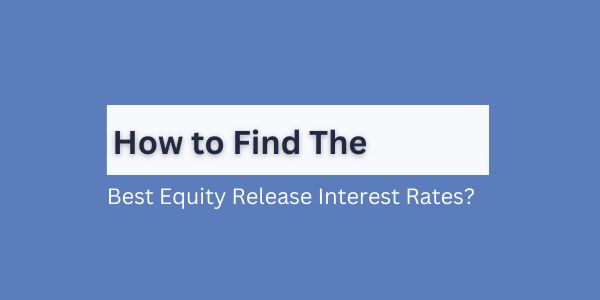When making a financial decision as significant as equity release, it is vital to understand the facts about equity release interest rates. Equity release is a structured financial option allowing you to unlock the value of your property.
While it can offer financial stability and flexibility, it is important to consider the long-term impact of committing to an equity release plan.
Equity release interest rates differ depending on the scheme and provider. Reviewing available options and understanding their impact on your finances is crucial.
This guide outlines the key facts about equity release interest rates to help you make an informed choice.
We explain the factors affecting interest rates, such as age, the scheme type, and the lender.
We also highlight the pros and cons of equity release and offer practical tips to help you secure the most suitable deal.
Understanding equity release interest rates
Understanding the basics of equity release interest rates is essential for anyone considering an equity release scheme. Interest rates affect the overall cost and the amount you can expect to receive.
By exploring the types of interest rates, their pros and cons, and their financial impact, you can make an informed decision about the right equity release scheme.
How equity release interest rates are calculated: Equity release interest rates depend on several factors, including the scheme type, the amount released, and the loan size.
Lenders determine the interest rate, which can be fixed or variable. Fixed rates remain unchanged throughout the loan term and are often higher than variable rates.
Variable rates can increase or decrease and are typically linked to the Bank of England’s base rate. It is essential to note that your interest rate will depend on your personal circumstances, as with any loan.
The importance of shopping around for the best rates

Understanding the basics of equity release interest rates is important for anyone considering an equity release scheme. Interest rates affect the scheme’s cost and the amount you may receive.
Understanding the types of interest rates, their pros and cons, and their impact on your finances is helpful. This knowledge allows you to choose the most suitable equity release scheme.
How equity release interest rates are calculated: Equity release interest rates depend on several factors. These include the type of equity release scheme, the amount of equity being released, and the loan size.
Lenders set interest rates, which can be fixed or variable. Fixed rates stay the same for the loan’s duration and are often higher than variable rates.
Variable rates, however, can rise or fall. They are usually tied to the Bank of England’s base rate. As with any loan, your personal circumstances also affect the interest rate offered.
Understanding these factors can help you assess the overall cost of an equity release scheme. It ensures you make an informed choice that suits your financial needs.
Are equity release interest rates fixed or variable?
Equity release interest rates can be fixed or variable, depending on your chosen product. Fixed rates typically offer more certainty concerning the amount of interest you will pay over the loan term.
Conversely, variable rates may be more attractive if you expect interest rates to drop in the future.
Therefore, understanding the differences between fixed and variable interest rates and comparing the options available before making a final decision is essential.
How to find the best equity release interest rates?

Finding the best equity release interest rates can feel challenging and time-consuming. However, securing the most competitive deal is crucial.
To achieve this, it is wise to compare a range of equity release plans available in the market. It is equally important to investigate the company providing the plan, as some may offer better rates than others.
Pay close attention to the fees linked to the plan, as these can accumulate over time and reduce the funds you receive.
Finally, ensure you fully understand the terms and conditions before proceeding. This knowledge will help you make an informed and confident decision.
Seeking professional advice on equity release interest rates
One of the most important steps is seeking professional advice on equity release interest rates. Before signing any agreement, you must fully understand the terms, risks, and potential benefits.
A financial adviser can explain the pros and cons of equity release in plain English. They can also help you decide on the most suitable option for your needs.
Depending on your circumstances, they might find you a better rate than those currently advertised. Speaking to a professional before committing to an equity release scheme is always a wise decision.
Equity release interest rates can vary significantly depending on the plan you choose. Researching and comparing available offers is essential before making a final decision.
You should also consider the potential risks of taking out an equity release loan. These may include reducing the value of your estate or facing possible tax implications.
With accurate information and a clear understanding of the risks, equity release could be a practical solution for accessing home equity during retirement.
Equity release is a suitable option for homeowners who need extra funds to support their retirement lifestyle.
Interest rates play a crucial role when evaluating your options. Researching and comparing rates is key to securing the best deal.
With careful planning, equity release can supplement your retirement income and improve your quality of life.
Thank you for reading our “The Truth About Equity Release Interest Rates | Take Note!” Stay “Connect“-ed for more updates soon!







